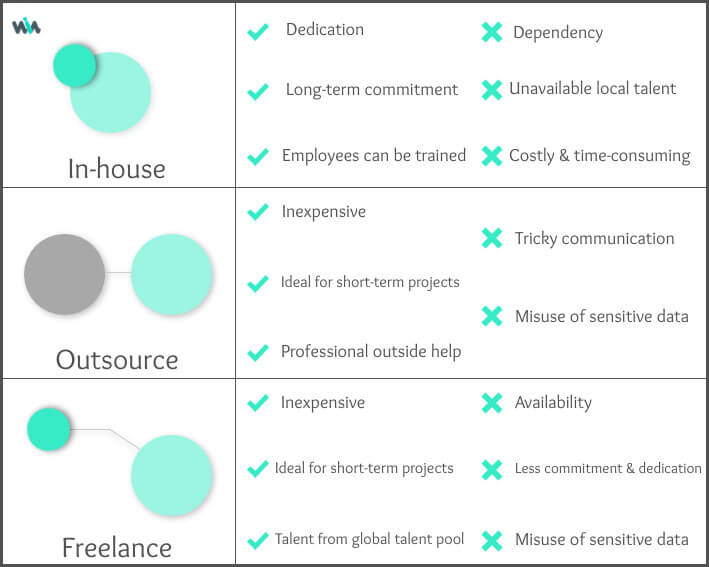“Do I build an in-house team (insource) to develop my software product?
Do I outsource my product?
Or should I hire freelancers instead?”
Answering these questions is a common struggle among all companies. Typically, when companies want to establish a new software project or build a minimum viable product (MVP), they have to choose between the three preceding options.
Of course, there’s no “right” or “wrong” answer; the best option varies in different circumstances for different companies.
For instance, many companies may praise the merits of outsourcing or hiring a team of freelancers, while others had horrible experiences.
To get a better sense of each of these three options, it’s worth defining what each concept means and what its advantages and disadvantages are.
What is an in-house team or insourcing?
In-housing (or insourcing) refers to conducting an operation within the company instead of seeking outside help; it’s the practice of assigning a project to a permanent employee (or a department).
When companies build an in-house team, they select and hire regular, full-time employees.
Pros of building an in-house team
- In-house teams are more dedicated
For regular employees, the company is always a priority in case of an emergency event, since the company is their only source of income. They are almost always available and can immediately take care of an unexpected issue.
- In-house teams have a long-term commitment
Once companies decide to hire an adequate individual, they regularly pay a salary and invest in the employee’s talent and time. Consequently, the employee has an in-depth understanding of the business and sticks around longer while striving to grow, and in turn, helps the company develop.
- Companies can train their in-house team
Even if companies fail to find an individual who matches their requirements, they can train their employees and develop their skills to the level deemed necessary after hiring them.
Cons of building an in-house team
- Companies will be entirely dependent on the in-house team
When companies hire in-house developers, their whole work becomes dependent on them.
If a team member faces an issue and becomes unavailable, the entire project suffers. The consequences might be grave, too, such as cost overruns and extended deadlines.
- Finding skilled local employees is a challenge
Sometimes, even after companies spend tremendous amounts of time and effort on searching their local talent pool and finally find a suitable candidate, their rates are too high.
Since there’s a high demand for skilled developers and the local talent pool is limited, finding a professional with the exact skill-set you need is difficult.
- Building an in-house team can be costly and time-consuming
The process of finding the right developers can be lengthy and stressful, and companies might have to spend hours interviewing different individuals.
Building an in-house team can also be quite financially challenging, especially for newly established organizations with lots of foreseen or unpredictable overheads.
Aside from the costs companies undergo in the vetting process, covering the developers’ health insurance and high salary is not easy.
Even though some businesses have continuously grown and improved their resources and in-house teams, some others aren’t as well equipped. That’s why companies outsource their projects or hire freelancers.
What is outsourcing?
Outsourcing is the opposite of insourcing; it’s the process of hiring an outside organization, a third party, to complete a specific task.
We’ve also written other posts about outsourcing; read Why Software Outsourcing Fails Most of the Time.
Below, we will discuss the pros and cons of outsourcing software development to another software company.
Pros of outsourcing software development
- Outsourcing is less costly and time-consuming (especially with an offshore company)
When companies outsource their software product, they don’t go through the lengthy process of interviewing and hiring they go through to find a suitable permanent employee, and that saves them plenty of time and money.
Companies also don’t need to pay high salaries every month when they outsource; they only need to cover the agreed expenses.
Also, since the rates are much lower overseas, outsourcing to an offshore company is a viable option. These overseas companies can deliver the same quality of work for a quarter of the local cost.
Read about global software outsourcing rates in another post.
You can also read about offshore developer rates on DAXX.
- Outsourcing is perfect for short-term projects
It’s only natural to build an in-house team when you have a regular and consistent workflow or large-scale projects. But hiring permanent employees for a one-off or short-term project is not very efficient. Outsourcing is ideal for these types of projects, and the outsourced company and its contractor can bid farewell after the project’s completion.
- There’s no need to train anyone!
Outsourced companies offer you a team of experienced software professionals. You don’t need to spend any time and effort to train anyone, because you have access to the talent you need already.
Cons of outsourcing software development
- Communication is tricky
Most companies are concerned about their involvement in project development and fear losing control over it when outsourcing and for good reasons.
Sometimes, outsourced companies and their contractors fail to communicate thoroughly, and this can cause deviations in the project or delays in the development process.
- Outsourced data can be leaked or misused
A disadvantage some businesses see when outsourcing their software product is the possibility of security risks.
It’s not uncommon for proprietary information or sensitive data to leak to a third party, even if it is unintentional.
Still, signing a nondisclosure agreement (NDA) might not be a bad idea; this contract prohibits the outsourcing company from sharing sensitive data.
What is freelancing?
A freelancer is a self-employed individual who offers services and makes money on a per-project basis (and usually works on several jobs for various clients).
Pros of hiring freelancers
- Hiring freelancers is even cheaper than outsourcing
Freelancers will most likely charge you even less than an outsourcing company since they don’t have the overheads outsourcing companies have, especially if they’re from overseas.
Companies also don’t need to pay the expenses they pay for regular employees for freelancers (like health insurance).
- Freelancers’ nature of work is temporary
Since freelancers take on project-based jobs, companies can hire them for a short amount of time for specific tasks and functions, and even hire them again in case they need to.
- Companies can handpick the talent they need
Luckily, with the development of freelance platforms like Upwork and Fiverr, finding and hiring suitable freelancers is an easy task.
All companies need to do is determine the exact set of skills they need in a developer and select the best applicant in their local or global talent pool.
Cons of hiring freelancers
- Freelancers might not be available when you need them
Unlike permanent employees, one company is not a freelancer’s only source of income, and their contracts can be relatively short. Freelancers will move on to another job after they finish one; their schedules can be pretty packed as well.
Therefore, sometimes when an unexpected issue comes up, and companies need freelancers to handle it immediately; freelancers are not available.
- Freelancers might not be as committed and dedicated as regular employees
Freelancers can take on numerous projects from various companies, and one job is not strictly their priority; that’s why they always view their contractors as buyers. Therefore, they may lack the commitment in-house teams have.
- Data can be leaked or misused with freelancers
Just like with outsourcing companies, freelancers can also intentionally or unintentionally mishandle sensitive data or leak it to a third party.
Companies can sign an NDA with freelancers to ensure their data’s confidentiality as well.
Conclusion
Companies ought to determine their expectations and requirements to choose the option that suits them best; while also considering each option’s advantages and disadvantages.
What is the scope of the project? Is the project a long-term one that needs a continuous working relationship after its completion? Can you find the talent you need in your local talent pool? How much is your budget?
These are all things companies need to consider before choosing between these three options and the services they offer to develop software products.
Of course, there are other options as well; for example, companies can temporarily hire individuals for specific jobs from leasing employee agencies.
The employees’ withholding, depositing, and reporting responsibilities remain with the leasing agency, and companies can use the employees’ services for as long as they need.
Through leasing agencies, companies don’t have to cover all the expensive overheads they do with regular employees (such as taxes and insurance). WinATalent also offers these services as a leasing agency.
Below is a chart that summarizes everything we discussed in this post.

What does WinATalent do?
WinATalent is an online freelance platform with a vetted network of talented individuals who are ready to help you develop your software product.
WinATalent offers various project estimation services as well.
We estimate the scope, timeline, and budget of your project based on criteria such as your expectations and your team.
We also help you get a better sense of your project’s completion process and its final product via analyzing different aspects of your project.

Offshore software development companies usually charge less and deliver the end product of the same quality as their onshore colleagues. The main difference between these approaches lies in communication. You either speak with your development team in person or via video calls.